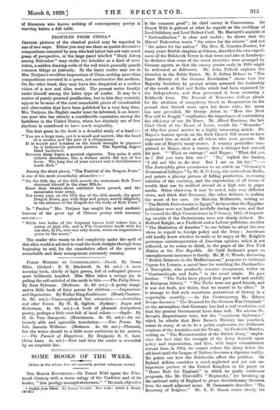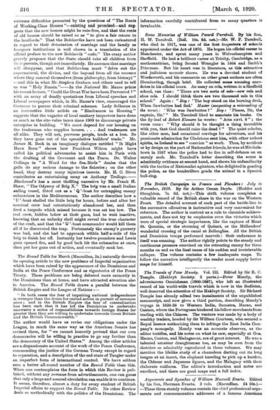SOME BOOKS OF THE WEEK.
[Notice is this column does not necessarily preclude subsequent review.] THE MARCH Mosrmsns.—Sir Ernest Wild opens the Nine- teenth Century with a warm eulogy of the Coalition and of its leader, " this prodigy amongst statesmen." " Its main objective • Profiles from thine. By Eunice Tietjene. New York: Alfred A. Knopf. IS11.6.3 is the common good" ; its chief enemy is Communism. Sir Ernest Wild is grieved at what he regards as the cavilling's of Lord Salisbury and Lord Robert Cecil. Mr. Marriott's analysis of " Nationalization " is clear and useful ; he shows that the Miners' Federation wants " the mines for the miners " and not " the mines for the nation." The Rev. R. Courtier-Forster, for many years British chaplain at Odessa, describes his own experi- ences of the Bolshevik Terror in that town and also at Lemberg : he declares that some of the worst atrocities were arranged by German agents, so that the enemy armies early in 1918 might be welcomed as deliverers. Mr. John Pollock explains the situation in the Baltic States. Mr. R Sefton Delmer in " The Inner History of the German Revolution " shows how the Majority Socialists by prompt action assumed the leadership of the revolt at Kiel and Berlin which had been organized by the Independents, and thus prevented it from assuming a Bolshevik form. The Provost of Worcester College pleads for the abolition of compulsory Greek in Responsions on the ground that Oxford must open her doors wide; his cause has now prevailed. Sir George Aston in " How the Next War will be Fought " emphasizes the importance of maintaining the efficiency of our Air Force. Mr. Alfred Harrison, the late Chief Clerk of the House of Lords, recalls his " Memories " of fifty-five years' service in a highly interesting article. Dr. Magee's famous speech on the Irish Church Bill seems to have impressed him as much as all others who were present. He tells one of Magee's many stories. A country pewholder com- plained to Magee, then a curate, that a stranger had entered his pew. " What an outrage ! ' said Magee : What did you do ? Did you turn him out ? " No,' replied tho farmer, ' I did not like to do that. But I sat on his hat.' "- The Fortnightly gives prominence to an article on " Germany's Economical Collapse " by Mr. R. C. Long, who writes from Berlin, and paints a gloomy picture of falling production, increasing inflation of the currency, and the exportation of all forms of wealth that can be realized abroad at a high rate in paper marks. Other observers, it may be noted, take very different views, and think that Germany, like other debtors, is making the worst of her case. Sir Malcolm Mcllwraith, writing on " The British Protectorate in Egypt," declares that the Egyptian politicians were not handled tactfully during the war, and that he warned the High Commissioner in February, 1915, of impend. ing trouble if the Protectorate were not clearly defined. Mr. Holford Knight, as a Pacificist and a Labour politician, ascribes " The Hesitation of America " to our failure to adopt his own views in regard to foreign policy and the Army ; Americans will hardly know whether to smile or be angry at Mr. Knight's grotesque misinterpretation of American opinion, which is not reflected, as he seems to think, in the pages of the New York Nation or the New Republic. Sir Cyril Jackson's paper on unemployment insurance is timely. Mr. H. C. Woods, discussing " British Interests in the Mediterranean," proposes to exchange Cyprus for Lemnos, a naval base for watching the Dardanelles. A Turcophile, who prudently remains anonymous, writes on " Constantinople and India " in the usual strain. He goes further. " The Turks have played their part well and usefully in European history." " The Turks were our good friends, and it was our fault, not theirs, that we ceased to be allies." It is strange to ford such monstrous perversions of history in a respectable monthly.—In the Contemporary Mr. Edwyn Bevan discusses " The Demand for the German War Criminals " on the assumption that Germany has had a real revolution and that the present Government have done well. We admire Mr. Bevan's dispassionate tone, but the " cumbrous diplomacy," which he admits that Herr Bauer's Ministry has practised, seems to many of us to be a polite euphemism for deliberate evasions of the Armistice and the Treaty. Sir Frederick Maurice, writing on " The Reconstruction of the British Army," empha- sizes the fact that the strength of the Army depends upon policy and organization, and that, with larger commitments abroad than in 1914, we cannot reduce the Army below the old level until the League of Nations becomes a vigorous reality. He points out how the Bolsheviks affect the problem. Sir Ryland Adkins considers a much-neglected and yet not un- important partner of the United Kingdom in his paper on "Home Rule for England," in which he justly condemns proposals, like Mr. Churchill's " Ileptarchy," for breaking up the national unity of England to please devolutionary theorists from the small adjacent areas. M. Cammaerts describes " The Recovery of Belgium." Mr. E. D. Simon states clearly the extreme difficulties presented by the questions of " The Rents of Working-Class Houses "—existing and promised—and sug- gests that the new houses might be rate-free, and that the rents of old houses should be raised so as " to give a fair return to the landlords." That the Bolsheviks have not been caricatured in regard to their detestation of marriage and the family as bourgeois institutions is well shown in a translation of the official preface to the new Bolshevik " code." The crazy author gravely proposes that the State should take all children from tax it parents, though not immediately. He assumes that marriage w ill disappear, and that Bolshevism must " drive out the supernatural, the divine, and the beyond from all the recesses where they conceal themselves (from philosophy, from history) " —and this in what Mr. Stephen Graham and others used to tell us was " Holy Russia."—In the National Mr. Masse prints his recent lecture, " Could the Great War have been Prevented ? " with an array of deadly quotations from Liberal speeches and Liberal newspapers which, in Mr. Maxus's view, encouraged the Germans to pursue their criminal schemes. Lady Selborne in an instructive little artiole on " Hindrances to Housing " suggests that the vagaries of local sanitary inspectors have done as much as the site-value taxes since 1909 to discourage private enterprise in building. " We must depend for our housing on the tradesman who supplies houses. . . . And tradesmen are all alike. They will not, perverse people, trade at a loss. So they have gone out of the speculative builders' trade." Mr. James M. Beek in an imaginary dialogue entitled " It Might Have Been " shows how President Wilson might have called his political adversaries to assist him in Paris with the drafting of the Covenant and the Peace. Dr. Walter Collings in " A Word for the Sea-Birds " denies that the gulls do any serious damage to the fisheries ; on the other hand, they destroy many injurious insects. Mr. H. C. Biron contributes an entertaining essay on Anthony Trollope.— Blackwood's has a most thrilling narrative by Mr. Frank H. Shaw, " The Odyssey of Brig X." The brig was a small Italian sailing vessel, fitted out as a Q '-boat for entrapping enemy submarines in the Mediterranean. The author describes how a U '-boat shelled the little brig for hours, before and after her nominal crew had ostentatiously abandoned her, and then fired a torpedo which missed because it was set too low. The real crew, hidden below at their guns, had to wait inactive, knowing that an unlucky shell might reveal the true character of the craft, and that the ' U '-boat commander would kill them all if he discovered the trap. Fortunately the enemy's gunnery was bad, and she had to approach within half-a-mile of the brig to finish her off. Instantly her twelve-pounders and Lewis guns opened fire, and by good luck hit the submarine at once, then put her guns out of action, and eventually sank her.











































 Previous page
Previous page